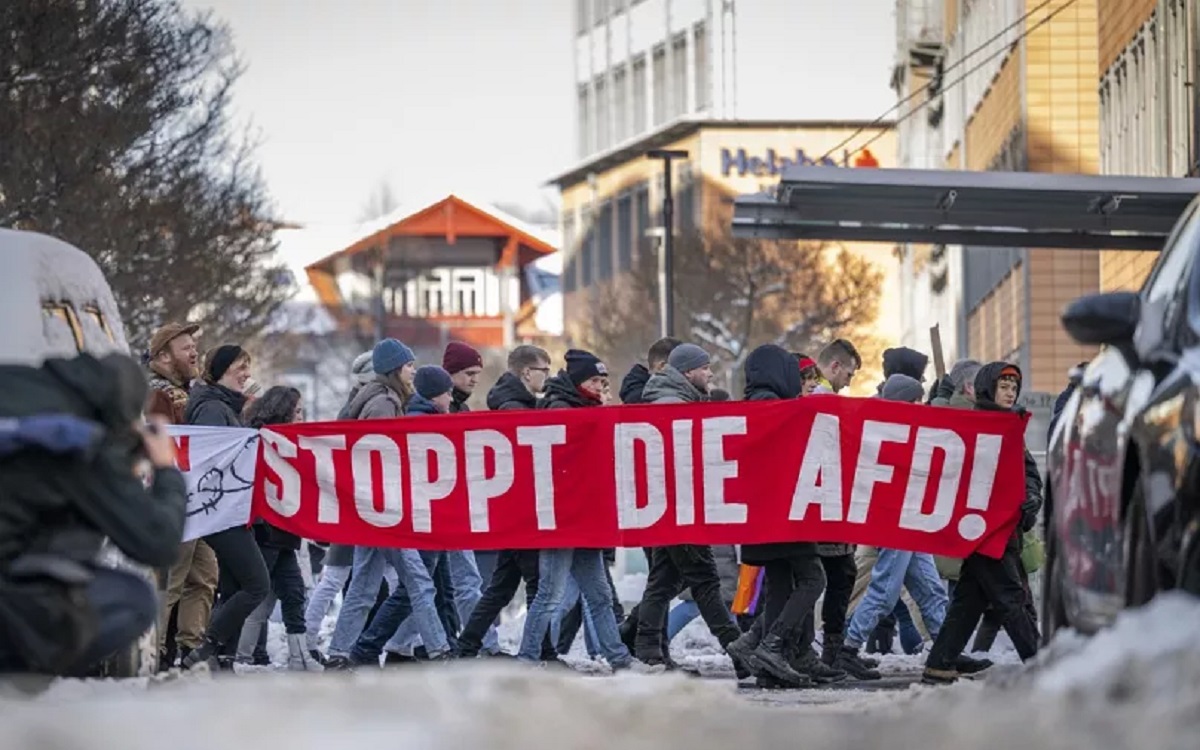
The ultra right of alternative for Germany -Afd- is second in the polls, while who goes first is the conservative and neoliberal candidate of Christian democracy Friedrich Merz. Both the current Chancellor of the Social Democracy (SPD) -olaf Scholz-, the Greens and Die Linke’s reformist left call a useful (“tactical”) vote against the extreme right, but they are responsible or supported the policies that led their resurgence.
To talk about this situation and what policy “from below” oppose, we interviewed Inés Heider this timeSocial Worker in Berlin, who together with Leonie Lieb – part of a hospital in Munich – both militants of Klasse Gegen Klasse (which integrates the international newspaper the daily left), and Franziska Thomas, Berlin, of the RSO current, are presented as candidates for Bundestag (German Parliament).
What detonated the crisis that ended in the call to early elections?
The final trigger was the resignation of the Minister of Finance, Christian Lindner, leader of the FDP (Free Democratic Party, of the Liberal Right. N.Det.), In November 2024, after irreconcilable disagreements about economic policy, among historical policy to favor of the economic rigor of liberals and the new needs of rearmament of German imperialism. This led to the dissolution of the coalition and the call to new early elections for February 23, 2025.
The government led by Foreign Minister Olaf Scholz had focused on promoting the remilitarization of Germany and applying adjustment policies to finance the rears, in full crisis of the German economic model. In addition, the German government stood out for an increasingly fierce warmongering, with sending weapons to Ukraine and Israel, as well as unconditional support for genocide in Gaza. All this and more led to a deep social discontent and historical casualties in the popularity of the government.
The crisis was deepened due to the inability of the coalition of proposing an exit to the economic crisis after two recession four months, with mass layoffs and factor closures in key sectors such as metallurgy and electronics. The internal rupture between the parties of the coalition around the budget rigor policies, added to low popularity, made it unsustainable that it could follow the coalition in the government without the rulers sinking into the discredit completely.
What do the surveys of Sunday’s elections say and what is behind the call to a “useful vote”?
Germany is going through a historical moment. The economic crisis is combined with a very deep political crisis. Surveys prior to the elections show a polarized scenario and a generalized turn to the right. AFDa very radical extreme right party, could reach a historical record of about 20%that is, twice as much of his last choice. For its side, The CDU/CSU (Called parties of the Union: the Christian Democratic Union of Germany and the Christian Social Union of Bavaria. N.Det.) Of Friedrich Merz It is emerging as the force with greater support and could obtain 30 % of the votes, with a radical xenophobic agenda and serious economic attacks against the working class. At the end of January, Merz spent an anti -immigration racist resolution in Parliamentdeliberately looking for the AFD votes. This implies a setback in its “sanitary cord” policy, which consisted that the other parties do not work together with the AFD (although in many cases they did) and caused the rejection of millions of people in the streets.
Given this situation, the question that emerges in the masses is to know how to face the right and generalized turn towards xenophobia and racism. Great marches have emerged throughout the country, but the only call to defend democracy and “sanitary cord” against the extreme right does not include a hard criticism against parties that already applied parts of the AFD program.
The call to the “useful vote” comes mainly from sectors that seek. However, this strategy has a background problem: These parties have supported racist, austerity and militarization policies, which has contributed to the growth of the extreme right or what is basically part of your political program.
The recent vote growth phenomenon for Die Linke expresses an important left politicization in youth. Faced with a polarized right -wing and a widespread adaptation of institutional parties behind their program, Die Linke appears as an alternative for many young people and for leftist voters who seek a form of hope in a situation that promises generalized attacks. The problem is that this lesser evil does not constitute an alternative option: Die Linke was part of coalition governments with the former Government of Scholz, the SPD, even in Berlin, and applied adjustment policies. His social program hides a will not to touch issues such as militarization, xenophobia, misogyny and genocide in Gaza. Actually, Die Linke preferred to throw the prolastation political militants of his organization, left his central criticisms to NATO and remains an organization deeply adapted to the German regime and their imperialism.
How is the rise of the extreme right of AFD and the possibility of a parliamentary agreement that includes them face in the streets?
In recent months, we have seen mass mobilizations throughout Germany against AFD and its racist policies. In cities like Berlin, up to 250,000 people took to the streets to reject the anti -immigration laws proposed by the CDU and tacitly supported by the AFD. These protests managed to temporarily stop some of the most reactionary measures.
However, these mobilizations have limits. Many focus on defending “democracy” against AFD, without questioning racist and neoliberal policies of traditional parties such as SPD and green, which have hardened immigration laws and expelled thousands of people.
To really face the rise of the extreme right, it is necessary to expand the struggles and link them to concrete demands: Abolition of racist laws, border opening, right to citizenship for all and end of expulsions. In addition, it is crucial to connect these struggles with resistance to social cuts, militarization and war. This last week of the campaign in Berlin was marked by important anti -racist marches, but also for unemployment days in the public service and in the sectors of public transports that carried out a 48 -hour unemployment struggle to demand a salary increase. If the mobilization becomes linked to these sectors, it can show an alternative path to the right to which we are attending.
Can progressive or neo -reformher expressions of the Greens or Die Linke be an alternative to the rise of the right?
Matches such as the Greens and Die Linke have shown that they are not a real alternative to the promotion of the right. When they have been in the government or in power positions, they have supported racist, austerity and militarization policies. The AFD could eventually fold its electoral results after the Center-left coalition government. For example, The greens have backed the rearma of Germany and the genocide in GazaThey apply a severely militaristic policy, which even led them to political tensions with the SPD. Die Linke and the Sahra Wagenknecht alliance separated. BSW (En alemán alianza sahra wagenknecht. N.det.) Call now apply a hard xenophobic program and their posters indicate “The country does not want more migration”. For its part, The left It has an electoral dynamic, but it expresses that there is a part of youth and workers looking for an exit from the situation on the left. But three months before, this same party He supported the conservative right of the CDU in the local governments of Turingia and nothing indicates that they will leave this type of betrayal. In addition, Die Linke continues to constitute a quite a bit to the right of the European reformist left, which did not carry out any rupture policy against German militarism and even supported the criminalization of the Pro Palestinian movement in Germany with the prohibition of the Samidoun organization.
These parties have contributed to the growth of the AFD by normalizing reactionary policies and failing to offer a real alternative to the economic and social crisis. A left that does not clearly oppose racism, imperialism and authoritarianism cannot be an effective anti -fascist force.
We believe that the true alternative is not to vote for parties that have betrayed the working class, but in building a mass movement in the streets, workplaces and universities, which fights against racism, war and attacks social. It is also about strengthening an alternative to the reformist left, with the construction of a revolutionary and internationalist left that opposes the genocide in Gaza, the complicity of the imperialist powers and the rearma of Europe.
For these elections they are presented with common candidacies with RSO. What are you proposing in the campaign and how do you see that you can really defeat the policies of the right and an even more conservative government?
We present ourselves in these elections with common candidacies between Rio (Internationalist Revolutionary Organization that drives the newspaper Klasse Gegen Klasse in Germany and is part of the Trotskyist fraction -IV International. N.Det.) And RSO (Revolutionary Socialist Organization, the brother group of the brother of L’Etinclle in France and Speak out now in the United States. German Trotskyist. Our campaign focuses on promoting an anti -capitalist and internationalist perspective, based on the self -organization of the working class and youth.
We focus our campaign on a program that demands to stop rearma guarantee the right to citizenship for all -12 million migrant workers cannot vote currently! – And stop expulsions. We also believe that we have to fight consistently against racism, sexism and climatic crisis.
We invite all leftist organizations to join us to build a revolutionary, anti -imperialist and anti -capitalist alternative that faces both right and the neoliberal policies of traditional parties.
These responses reflect our commitment to an independent policy of the capitalists, the State and the reformist parties, and our determination to fight for another type of society, with a planning oriented not to the growth of the wealth of few, but to the needs of The working class and the popular majorities.
Source: www.laizquierdadiario.com

